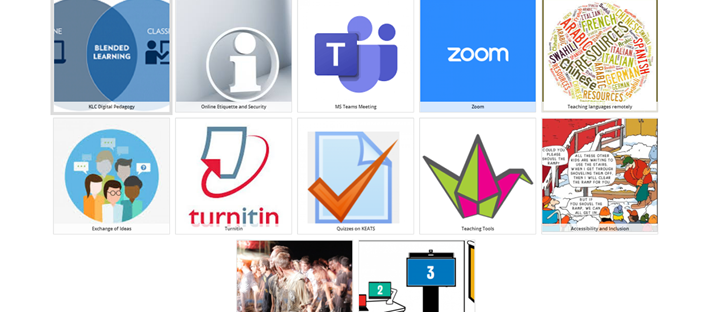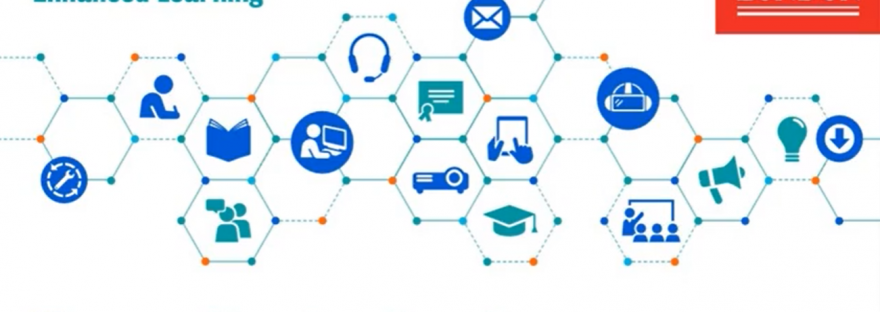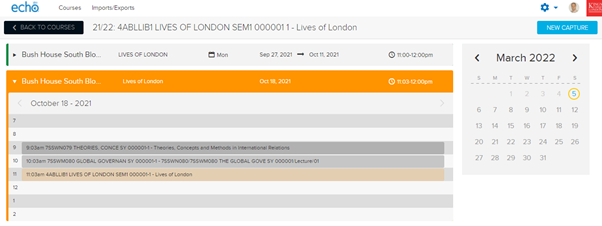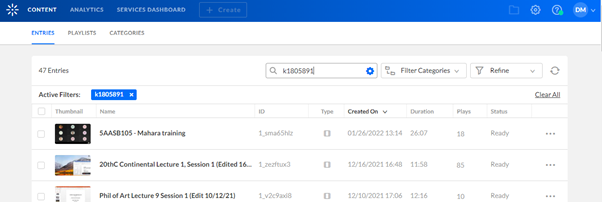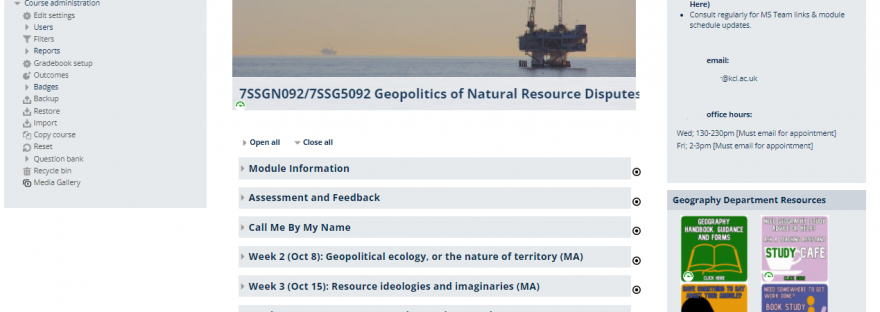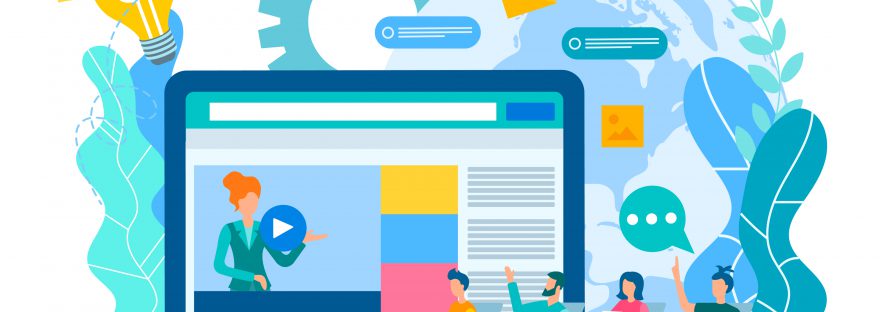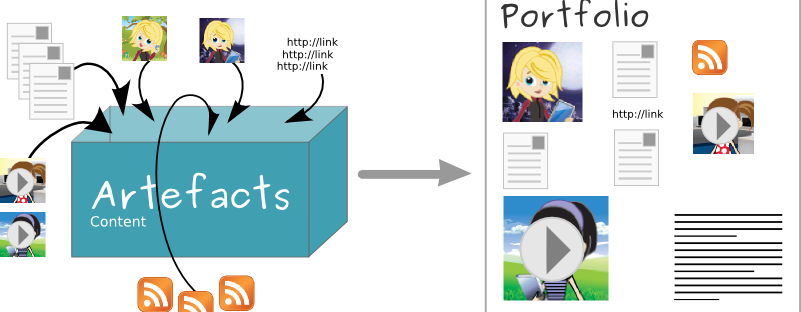A holistic approach was adopted by the King’s Language Centre (LC) to comply with the legal requirements of accessibility. The Senior Leadership Team (SLT) has been instrumental in driving the change not only with the academics, but also with members of the Professional Service team (PSS). The approach combined top-down and bottom-up strategies that have been successful in improving all our digital resources, including KEATS pages, educational materials, and templates for essential documentation. Continue reading “King’s Language Centre Approach to Digital Education Accessibility”
Tag: TEL
KEATS 3.11 UI Refresh
Feedback from students from various channels across King’s have reported that there is a lack of consistency in the User Experience (UX) and User Interface (UI) across KCL’s digital platforms, particularly the website and across templates and module pages within KEATS. Continue reading “KEATS 3.11 UI Refresh”
Introduction of Captioning and Transcription Service at King’s College London
In September 2020 King’s College decided to commit to further developing the Captioning and Transcription Service available via the King’s media platform (Kaltura). Academic staff were provided with access to request high quality human transcriptions for their lecture recordings. Continue reading “Introduction of Captioning and Transcription Service at King’s College London”
Part 2: Embedding Digital Accessibility to the heart of everyday TEL work
This article has been divided in two parts. Part 1 discusses how the SSPP TEL team works to boost staff understanding of digital accessibility baseline. Part 2 provides an overview of the TEL training sessions available on the subject.
Part 2: TEL training sessions
The TEL Hub digital accessibility section is aimed at staff to access information in order to meet the basic requirements of digital accessibility baseline from a more administrative perspective. Continue reading “Part 2: Embedding Digital Accessibility to the heart of everyday TEL work”
Part 1: Embedding Digital Accessibility to the heart of everyday TEL work
This article has been divided in two parts. Part 1 discusses how the SSPP TEL team works to boost staff understanding of digital accessibility baseline. Part 2 provides an overview of the TEL training sessions available on the subject.
Allyship:
“the state of being an ally (= a person who helps and supports somebody) to a particular group of people that you yourself do not belong to, in order to help ensure their basic rights and ability to be happy and successful in society”- Oxford learner’s dictionary
What does digital accessibility mean to me? It means being able to embrace a platform for its intended use, because the people building it know how to create a great user experience – anticipating, rather than reacting to the needs of our diverse learning community. Being an ally. Continue reading “Part 1: Embedding Digital Accessibility to the heart of everyday TEL work”
Part 2: Reflections on collaboration/cross-institutional working in response to and after Covid-19
This article has been divided in two parts. Part 1 explains the online teaching challenges created by Covid-19. Part 2 presents the outcomes and conclusions after 2 years teaching online.
The volume of shared working, and working through a time of crisis, has helped to build collegiality, camaraderie and significant trust between teams. I believe this is evidenced by the devolution of central services to Faculty TEL teams (and not solely explained by capacity reasoning). For example: the provision of the Echo Scheduler role, Syllabus+ access being extended to TEL; and hopefully – successful pilot permitting – the Kaltura Management Console Super User role. Continue reading “Part 2: Reflections on collaboration/cross-institutional working in response to and after Covid-19”
Part 1: Reflections on collaboration/cross-institutional working in response to and after Covid-19
This article has been divided in two parts. Part 1 explains the online teaching challenges created by Covid-19. Part 2 presents the outcomes and conclusions after 2 years teaching online.
Covid-19 forced almost all teaching online in extremis and for an extended period of time. This was followed by at least a year of crisis management; attempting to continue to deliver the core functions of the College in the face of a global pandemic. Almost overnight TEL went from a support function to being of central importance to teaching and learning. Tools that may have been peripheral became, in effect, core. New tools rapidly became universal. The barriers between the substance of teaching and its delivery mechanisms began to dissolve. IT and TEL colleagues deserve immense credit for the way they managed the sudden massive increase in demand for their services, time and expertise. With the crisis period of the pandemic hopefully in the past, we can now reflect on the enhancements that have come about in our working practices, whether these were created or accelerated by necessity and which we choose to keep for the future. Some of the observations below are concrete, others are my personal reflections or opinions voiced by colleagues. Continue reading “Part 1: Reflections on collaboration/cross-institutional working in response to and after Covid-19”
Credit Harmonisation at King’s College: Case Study at the Faculty of Social Science and Public Policy
The majority of modules in King’s College use the 30/60 credit split. This structure was introduced over 15 years ago for undergraduate modules to replace the “course unit” model. However not all postgraduate modules were also moved to this new structure, meaning there were different credit values assigned to different modules at PG level. Continue reading “Credit Harmonisation at King’s College: Case Study at the Faculty of Social Science and Public Policy”
Lessons learned and looking forward: reflecting on online assessment in the IoPPN during the COVID-19 pandemic
The COVID-19 pandemic resulted in the university cancelling all in-person examinations and offering alternative online exams. As a collaboration between the IoPPN and King’s Academy, we wanted to gain a snapshot of the impact these changes had on PGT students. The focus at King’s is often on UG students and so we wanted to explore the views our PGT students across a number of programmes. As King’s considers a move towards more online submission and marking of coursework, the introduction of alternative assessments in a digital format and, of course, the use of online examinations software tools, we hope that this data on what students think and feel and think about the approaches taken during 2020 will help inform the best way forward. Continue reading “Lessons learned and looking forward: reflecting on online assessment in the IoPPN during the COVID-19 pandemic”
Using Mahara e-portfolio across Arts and Humanities
Mahara e-portfolios are used across the Faculty of Arts and Humanities (A&H) to broaden the assessment diet, support practical and situated learning and build digital literacies. Increasingly, teaching in A&H lends itself to the use of Mahara as both a site for a product of student learning. This will be of interest to colleagues who are interested in exploring and developing the use of e-portfolios in their own areas. Continue reading “Using Mahara e-portfolio across Arts and Humanities”
